
一个由青年主导的哲学社团。
Is the Taliban "the choice of the Afghan people"?
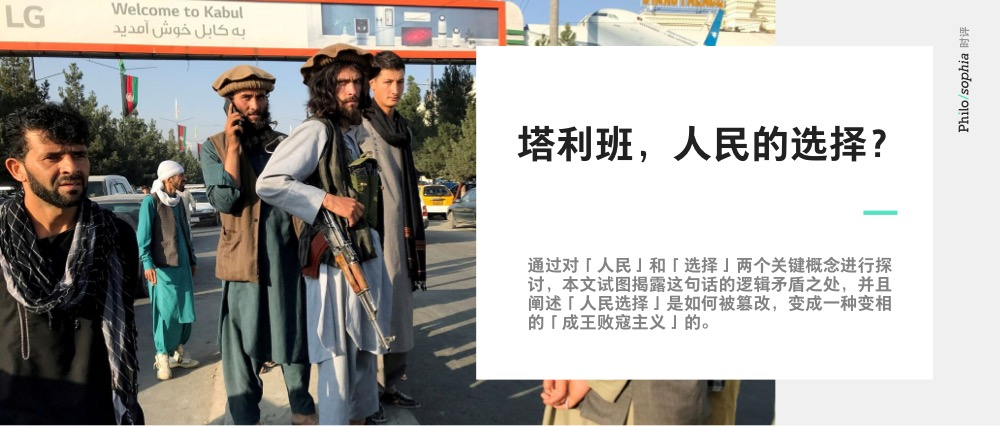
Author / Hoshihara
1 Preface
In the past "10 days that shook the world", the militant group "Taliban" quickly conquered the city and entered Kabul, the capital of Afghanistan, on August 15, and regained power in the country two decades after the US invasion in 2001. Government troops have surrendered, while former President Ghani fled the country. The triumph of an armed group once famous for blowing up the Bamiyan Buddha, dealing in opium and human beings, destroying the rights of women and minorities, and even banning singing and watching movies has caused uproar in the domestic and foreign media circles.
At the same time, it is not difficult to find that there are many voices defending the Taliban and even supporting the Taliban on the domestic Internet. A well-known example is as follows:
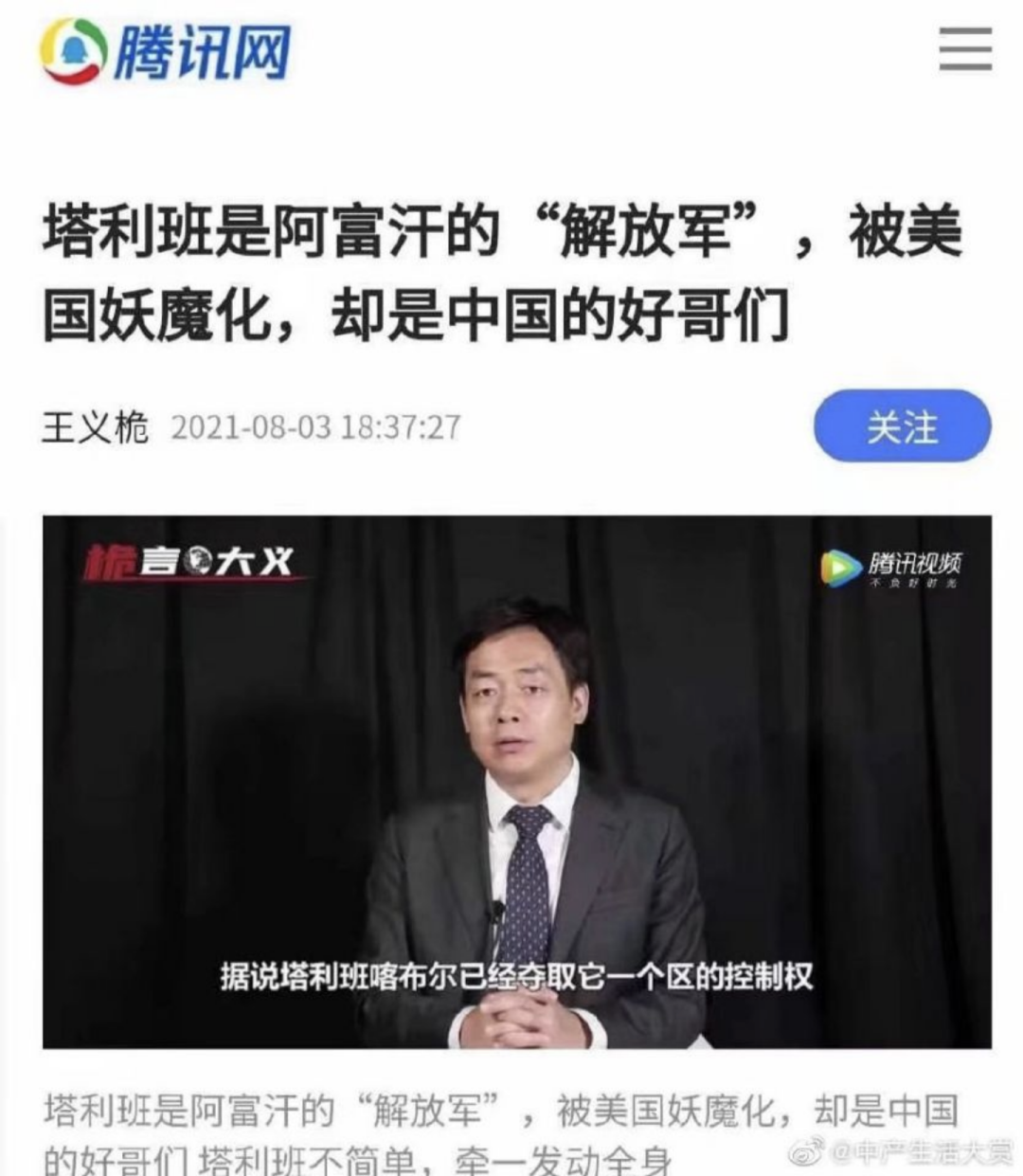
Before proceeding, it should be emphasized that we understand that the demands of real-world politics make it necessary for China and the international community to engage, negotiate, and even recognize the Taliban as a legitimate regime in the future. At the same time, the "principle of non-intervention" in international law must also be incorporated into moral concerns. It is also difficult to foresee at this moment whether the Taliban will govern differently than it did 20 years ago when it seizes power in 2021. At the same time, it is conceivable that many Afghan civilians would also like to see the return of order and peace, no matter who ruled it. However, even taking into account such factors and concerns, many arguments in favor of the Taliban still have major errors and loopholes in their logic and arguments.
2 "The People's Choice"
A frequent argument is: "The Taliban are the choice of the Afghan people." One reason they make is that the Afghan government is completely unpopular, corrupt and incapable of truly improving the lives of the Afghan people. Of course, this is largely true - the Afghan government's bribe-taking and cronyism is so severe that many international agencies, including the United Nations, have made it clear. [1] According to the Global Risk Profile 2020 Corruption Index Report, Afghanistan ranks among the most corrupt countries in the world[2]:
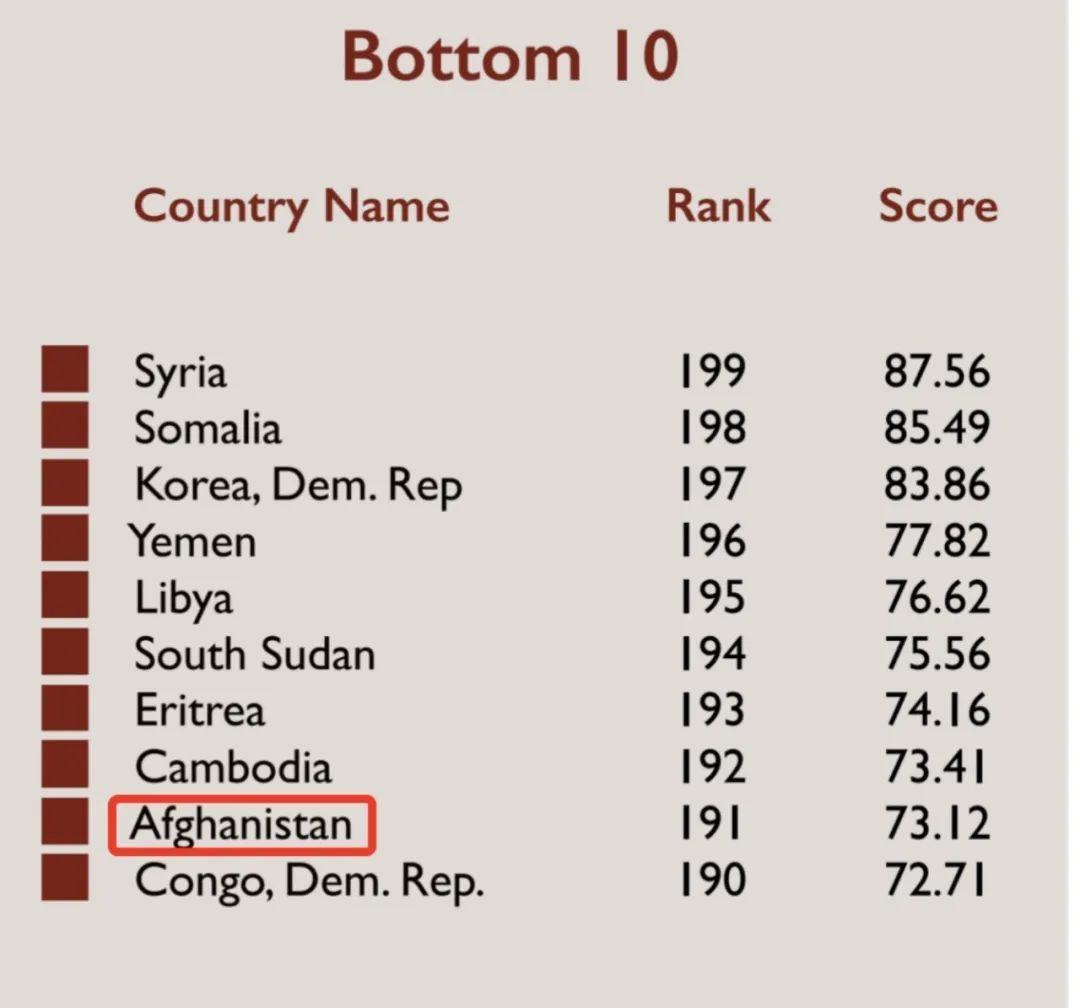
In contrast, American anthropologist Scott Atran argues that in many rural areas controlled by the Taliban, the Taliban can provide basic security and stability that the old government could not, and "prevent widespread rape and looting" . [3] At the same time, another less-mentioned factor of "popularity" is that the Taliban have supported and protected the opium cultivation and trade of many Pashtun farmers since the 1990s - which is more than the cultivation of food. Said to be more profitable, and for many communities whose irrigation systems have been destroyed by war, this is the only option (the poppy trade has thus become the Taliban's largest source of profit). [4] Therefore, it is not entirely unreasonable that "the Taliban have a better mass base than the government in many areas".
However, does this mean that the Taliban truly represent the choice of the "people"? Let's look at the following argument:
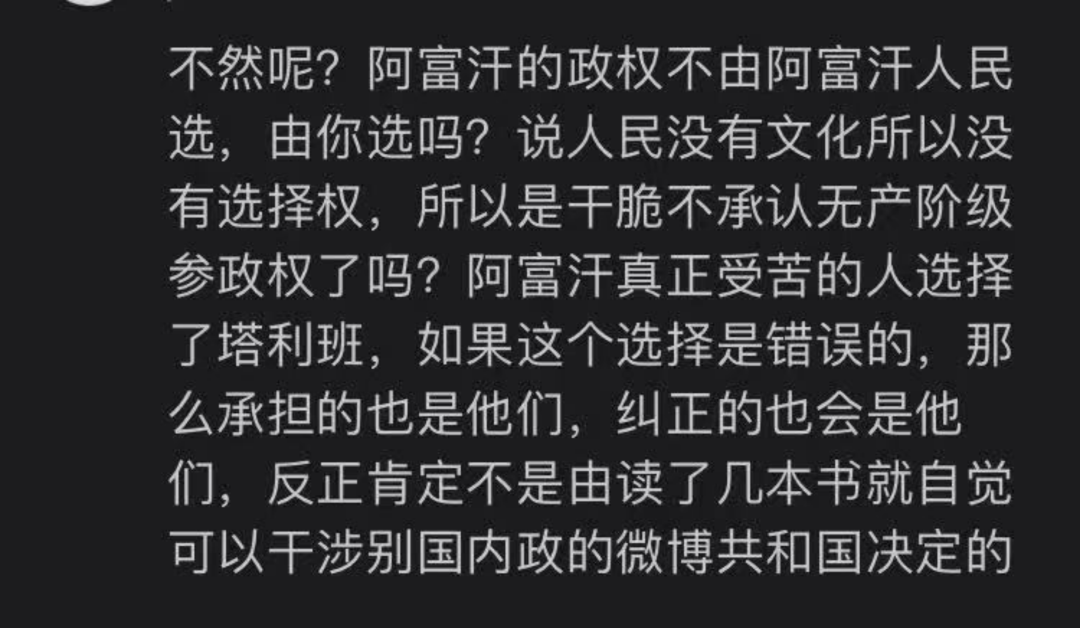
First of all, netizens criticize and accuse the Taliban of not "interfering in other countries' internal affairs" - if so, Chinese netizens have already completely interfered in the internal affairs of the United States. "Interference in internal affairs" must be an act between sovereign states and has nothing to do with individuals.
More important than the above entanglement is the discussion of "the people's choice". The Taliban's victory seems to fit many people's impressions of a "people's war": grassroots guerrillas from the countryside have won the final victory over the foreign-backed government entrenched in the cities. However, after careful analysis, we will find that there may be hidden problems with the statement "people's choice". Therefore, we need to think about the implied meanings of the words "people" and "choice" separately, and discuss the contradictions at the end of the article.
2.1 About the "people"
So, what is this "people" among the "people of Afghanistan"?
We can distinguish three understandings of "people" from common terms:
- The first is the body of citizens in a sovereign state, who make and follow the system of the constitution;
- The second is under the "national narrative" where people refer to the totality of (loyal) members of a national community. In slogans such as "the Chinese people are not easy to mess with", "people" falls into this category;
- The third usage has strong modern Chinese characteristics - the specific division method is more vague, but in the general image it refers to the totality of members who are engaged in production work in the society. [5] An example is: "The people of the world will surely win".
The implication common to the second and third interpretations has to be articulated in a "rebellious narrative", where these two concepts of "people" posit some group as opposed to "people" , such as the "ruling class" or "the people". Traitors of the nation" are the defenders of the established order, and the people, as a creatively challenging force and potential to disrupt the established order, are bound to sweep away these "enemies of the people" .
We have found that a hybrid product of the second and third usages is the most common (in discussions of the Taliban), and we will build on that in this article. First of all, it is difficult to say that there is a "community under the constitution" in Afghanistan, so the first understanding does not fit the actual situation; secondly, in the general discussion, we did see many remarks that "expelled some Afghan groups from the ranks of the people": For example, the people who tried to flee at Kabul Airport were slandered as "lacking dogs"-they were seen both as the ruling class and social elite, and as "national traitors" who cooperated with the United States, so many netizens no longer regarded them as "traitors of the nation". part of the Afghan people".

Of course, there is a big problem with this (pseudo) class classification - because the criteria for "expelling the people" are very vague. As a result, it often becomes a strongly subjective judgment based on political attitudes, and thus is not actually as closely related to "class" as it claims to be. For example, many people collectively refer to supporters of the old government, or those protected from the old regime, as "traitors," "traitors," or other kinds of "non-people." Of course, these people will indeed be more "secularized" and "pro-American" than the supporters of the Taliban, more likely to live in cities and have higher incomes; however, their specific industries or incomes are not many of them being "excluded from the people" by netizens. a necessary factor for membership. The accusations and accusations against them basically presuppose their political stance. Therefore, the Taliban have naturally become "the people's choice" - those who do not choose them are no longer "the people".
This kind of “exclusion” process is not only a logical cycle, but also untenable in empirical evidence, and it also dissolves the empathy with refugees. The following remarks perfectly embody how the above-mentioned two kinds of "exclusion of people's nationality" are integrated:
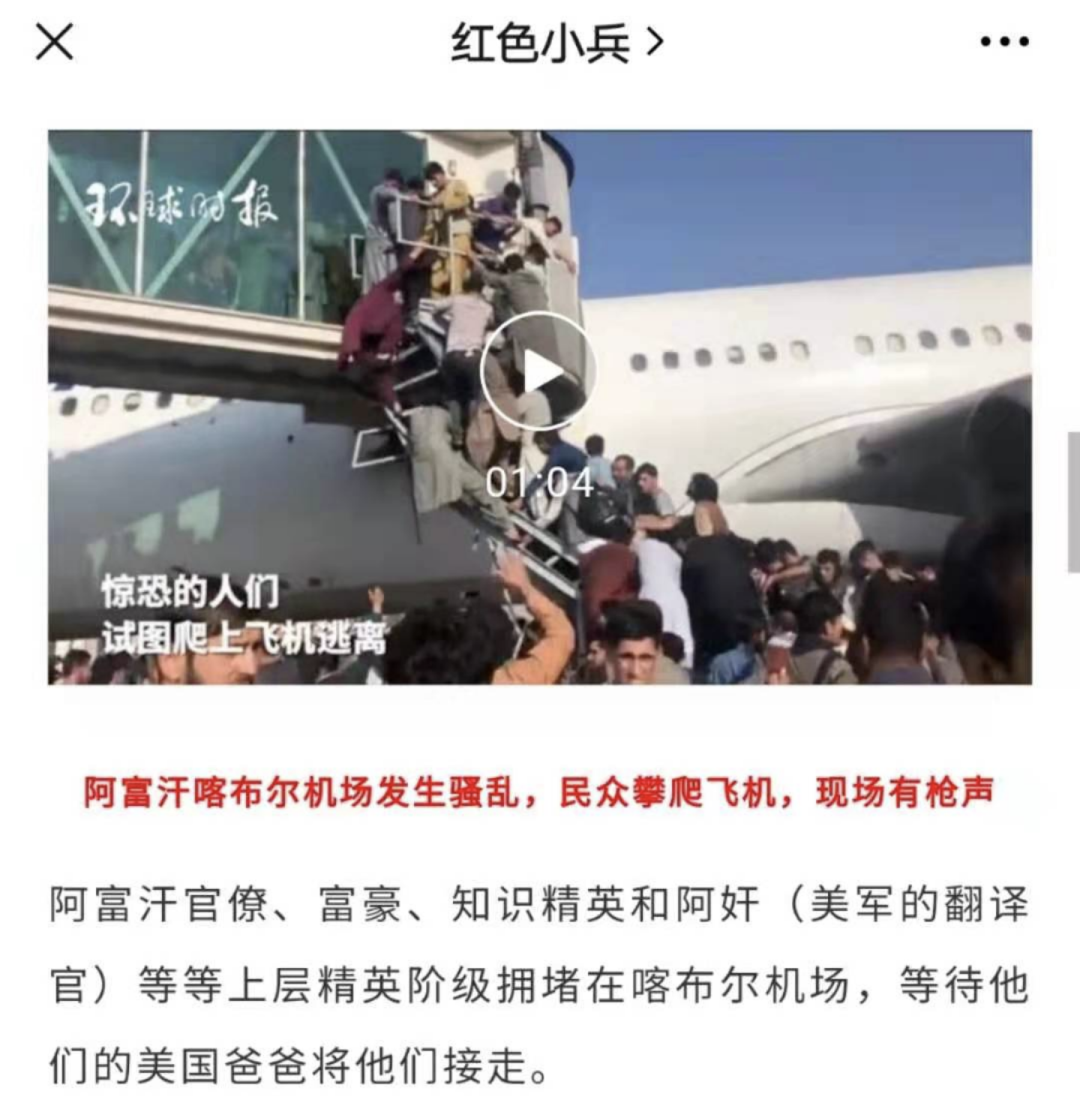
The problem with the remarks in the picture is, do those who want to escape from Kabul, who want to escape from Taliban rule, must be these "upper-class elites"? The answer is obviously no. First, there are a lot of people who fear Taliban rule for a variety of reasons - the Taliban is a Sunni, Pashtun-dominated group, and Pashtuns only make up about 45% of all Afghan population . For example, the Shiite Hazara, who live near the Bamyan region, have always had a very tense relationship with the Taliban. Other ethnic groups, such as Tajiks or Uzbeks, also have many fears of the Taliban (although the Taliban has increasingly recruited members of these groups in recent years). [6] These people are not very rich - before the Taliban took Kabul, Kabul was already crowded with refugees from various provinces, and many had to stay in the streets and parks. [7] Among Kabul citizens, many of them still have fresh memories of the Taliban's harsh ban, arbitrary executions, and revocation of basic public services in Kabul. Among these people, there are very few people who can be regarded as elites, and some are even destitute. Here's what many Afghans looked like a few days ago as they crossed the Pakistani land border:
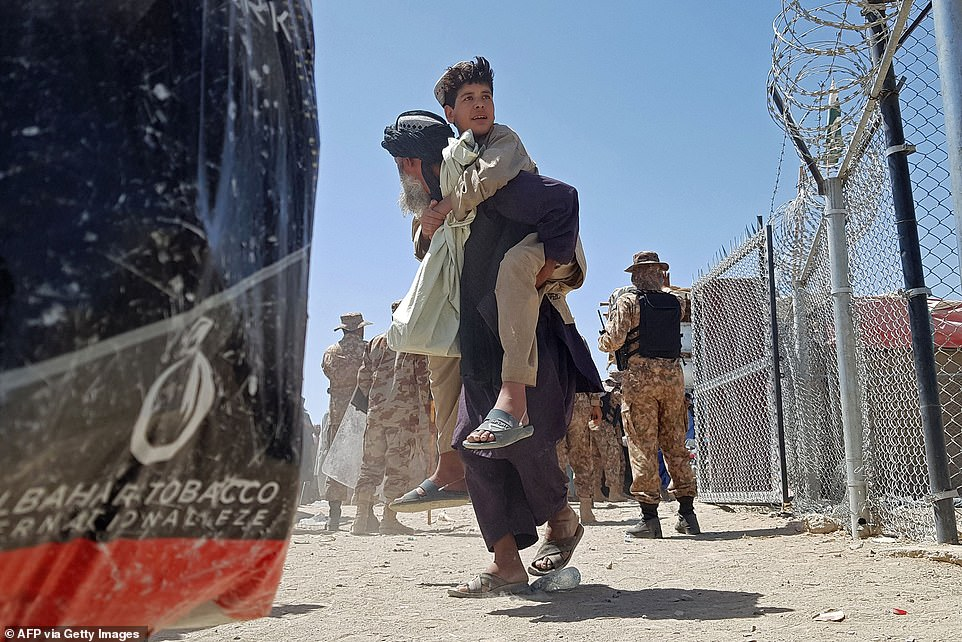
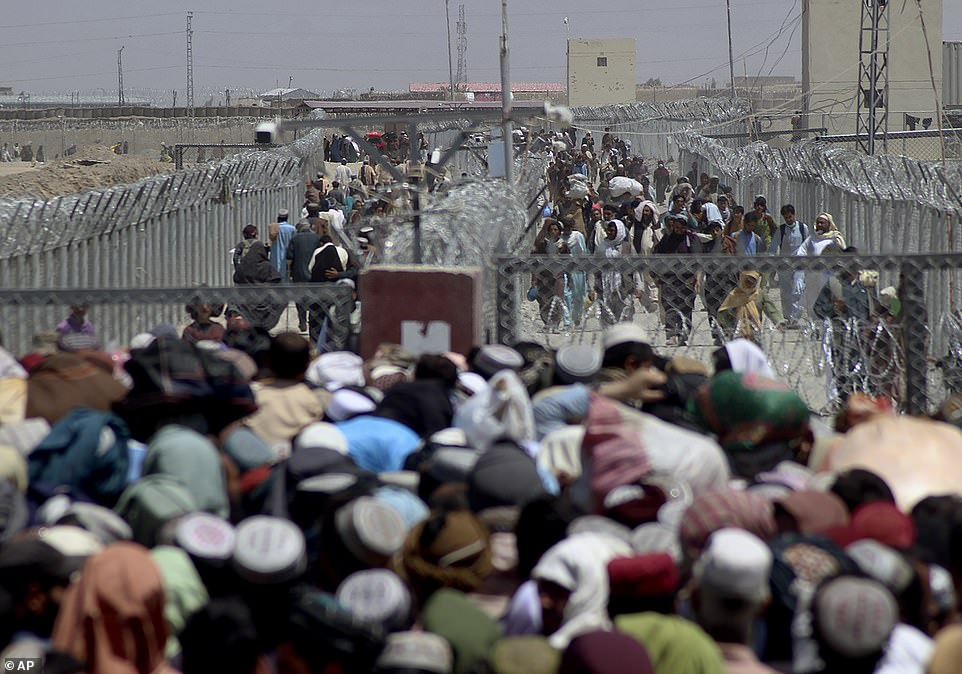
As for the real elites, they did run away, but they weren't so embarrassed at all. While many fled naked on foot or strapped themselves to planes, Afghan President Ghani's nephew took a more "elegant" approach - leaving on a private jet. [8]

It also shows that the same and subjective "Afghan people" (as opposed to "Afghan elites") is only an illusion - such a grand narrative ignores many regional, localized conflicts and power operating structures, Completely inconsistent with the complicated reality.
Such a "pseudo-people narrative" is the product of forcibly applying a certain fixed discourse paradigm in Chinese history to the context of Afghanistan, cutting down on its feet. For example, many refer to the people fleeing Kabul, and the old Afghan government, as "comprador bourgeoisie" (obviously outside the category of "people"), not for the benefit of their own country:
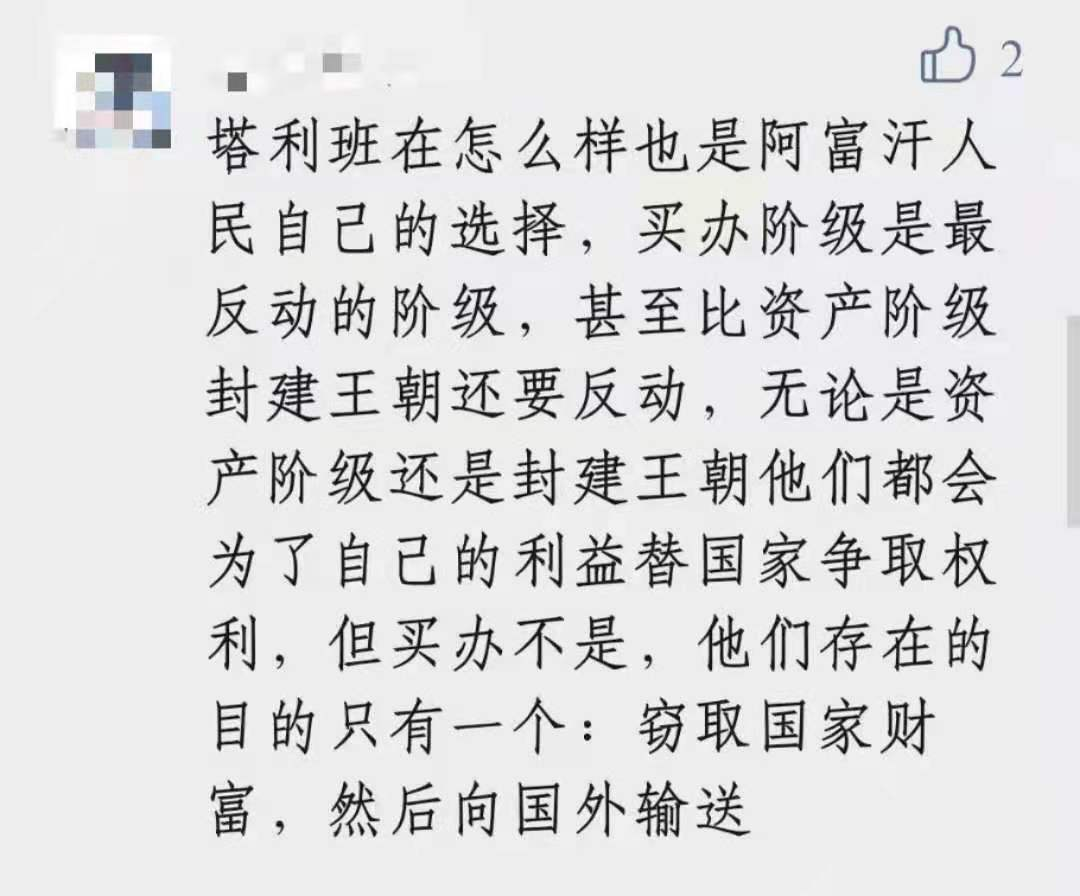
So what kind of wealth can the US imperialists steal and exploit through these Afghan compradors? Afghanistan's ability to digest U.S. goods is limited, and Afghanistan's mines are untapped. Instead, three-quarters of the Afghan government's fiscal revenue comes from international donations, while the United States also pays extra for the entire Afghan army. [9] Statistics show that since the beginning of the war, the United States has spent about 140 billion US dollars in aid to Afghanistan - this is not counting the consumption of US troops stationed in Afghanistan to the local economy. [10] Of course, the old government or the U.S. military is not here to defend : due to government corruption and inefficiency, much of this aid is embezzled or wasted, and makes the government weaker and more rent-seeking[11]; Moreover, the presence of U.S. troops and many reckless military operations have also contributed to the vicious circle of conflict and hindered the peace process. For a scathing critique of U.S. policy, read Astri Suhrke's book When More is Less. But there is no doubt that the United States has gained only a handful of benefits from this "investment", and Afghanistan is a "bottomless pit" that makes the "suzerain" lose countless money. So it is not foreign countries that are constantly plundering Afghanistan's wealth, but that many of Afghanistan's economic projects and the livelihoods of countless ordinary Afghans depend on huge sums of foreign aid.
Taking it to the next level, the World Food Programme (WFP) has warned that food shortages in Afghanistan are sharply worsening and could become a humanitarian disaster - and food has always been an important part of international aid. [12] The Taliban's rise to power will inevitably bring about a massive reduction in international aid, making food even more scarce. Do ordinary Afghans, facing famine, think the Taliban's seizure of power is a huge risk? How many ordinary people who have the ability and luck to escape would not choose to escape?
The much-criticized U.S. policy in Afghanistan does not mean that those who want to leave must have participated in the evil deeds of the U.S. military and the previous government, or are "compradors" with vested interests; many Taliban supporters on Chinese-language networks are likely to forget: " No investigation, no right to speak". Without a specific study of the local situation, forcibly stuffing the situation into the fixed "thinking paradigm" in one's own brain, isn't it a new "bookism" and "dogmatism"?
Therefore, this imagining of "the people" and "enemies of the people" created by forcibly using the categories of Chinese history does not actually correspond to reality. Who the "people of Afghanistan" are remains a question that needs to be explored below.
2.2 About "Choice"
On this basis, we can further analyze the meaning of "choice" in "the people's choice". Since the concept of "Afghan people" is full of loopholes, a question arises: "Who chose the Taliban?" We cannot say vaguely: "History chose the Taliban"; history itself has no will and cannot make choices. This is just a historically deterministic rhetorical device. So which actors in reality "choose" the Taliban, and what kind of "choice" does this "choose" look like? And how to make a "choice" that is good and truly representative?
A very common statement is: "Many people who support the Taliban have actually been fooled and bewitched since childhood, believing the Taliban's empty promises. Therefore, their 'choice' does not really represent their own interests, they are deceived Yes.” There is some truth to this statement – the Taliban has always blamed the “infidel foreign aggressor forces” for the root cause of all problems in Afghanistan, and it is difficult for those who have been affected by such incitement for a long time to do well. "choose". However, this article will not overemphasize this point, because the argument of "what is 'false consciousness'" itself is relatively subjective and may be suspected of not respecting the autonomy of others. We still need to address the problem with this "choice" from other perspectives.
For a political force to win, whether through elections or civil war, there is no doubt that it needs the support of many groups and individuals. However, under what rules are these "supports" transformed into political power, and whether these rules can properly reflect the will of the people is a question worthy of study.
First, under what circumstances does the people make a "choice" that is laudable and gives moral legitimacy to this supported political force?
Many people intuitively recognize that the choice of offering a form does not necessarily mean that there is a substantive choice. For example, when a robber holds a knife and asks the victim whether he wants money or death, or when an elementary school teacher says, "Would you like to answer the question on the blackboard?", it is difficult for us to say that the other party has any real "choice". , although they do have an apparent form of "choice".
So, what would be the inference of this simple truth in the context of a revolution or civil war? In the civil war, "fair and universal suffrage" and other strict sense of "choice" cannot be achieved. Then, we have to focus on whether a certain force is supported by liberating individuals from old, repressive and even oppressive structures and enabling them to control and supervise the operation of power relatively equally, or rely on to gain power through oppressive, authoritarian structures. If we do not pay attention to the above-mentioned issues, then the so-called "people's choice" may actually be "the choice that the people have no choice", or the choice of the "local power faction".
In such frameworks, power and political influence are distributed among individuals in a very unequal manner. The powerless may give such organizations a degree of acquiescence, even cooperation and participation. For example, many Afghan Pashtun bottom tribal people will pay taxes to the Taliban and seek their protection. However, their "cooperation" does not prove that they have made a real "choice", because the background of this choice may be the pressure from the traditional tribal structure, or it may be desperate, desperate and the possible threat of force from the Taliban.
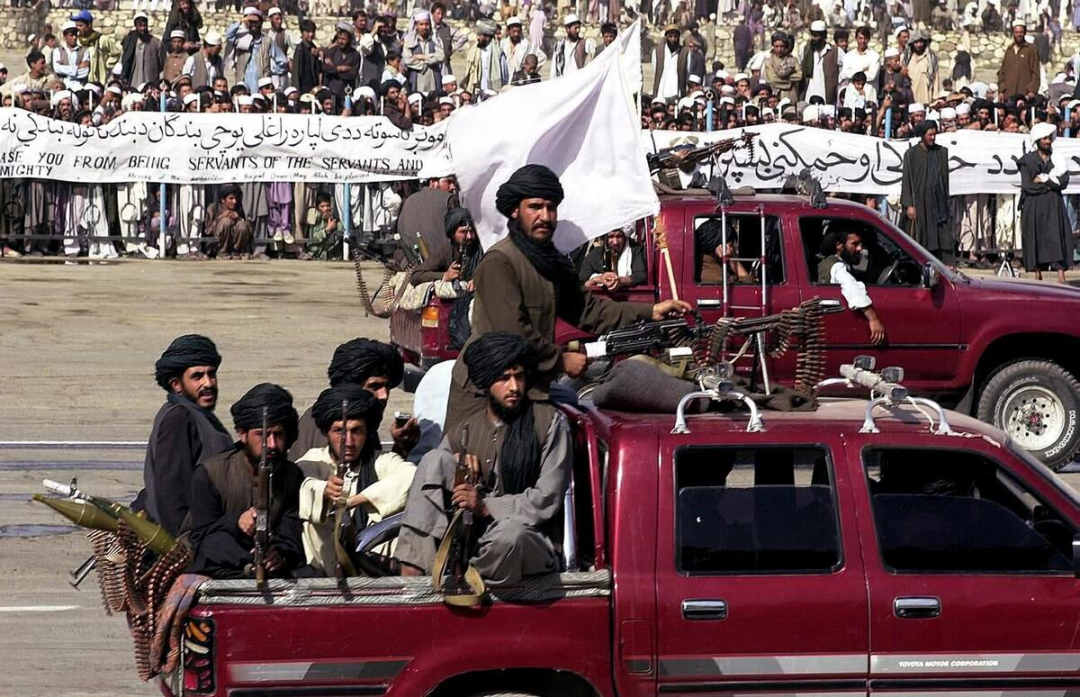
The "support" that an organization ostensibly obtains, as well as the amount of political forces and numbers it can mobilize, does not directly determine whether it is "better", but rather reflects "the will or interests of the people." Sometimes an organization can gain significant political power by mobilizing many traditional social structures and by suppressing the political participation of many. However, in judging whether an organization reflects the "will of the people", the following questions must be taken into account: "Is there any group of members of the society that has much greater political influence than others?" "This organization and the masses Who are the middlemen? How do they use their power to control the masses?” and so on. Just considering how much political power the organization has achieved, or whether its fighters are on average rich or poor, it is impossible to directly determine to what extent it reflects the will of the people.
So back to the Taliban, how did they get support?
We can find that they started from the direction of religious authority and clan at the same time to encourage the support of the largest Pashtun ethnic group in Afghanistan. Taliban leaders (mostly Pashtuns) have clan or in-law ties to many specific Pashtun tribal leaders. [13] At the same time, the destruction of the authority of the Pashtun secular elders after the Soviet invasion enabled religious leaders who received religious education in the post-Soviet era to gain great social power. Religious education requires proficiency in Arabic and teaching methods, so they Most also come from wealthier rural families. These men are also close allies of the Taliban. [14] Therefore, the Taliban can easily be mobilized through the system of clan and religious authority, and these systems with strong class and authoritarianism can hardly be said to equally reflect the wishes and preferences of the general powerless people.
From an ethnic point of view, the view that the Taliban has the "choice" of the majority of the people also makes no sense. Until the past five years, the main activity area of the Taliban was only in the southern Pashtun region (Pashtuns account for less than half of the population) , and the support obtained in other ethnic regions (the north) was very weak. Even the recent triumph in Afghanistan is largely due to the self-destruction of corrupt government forces rather than the popular support the Taliban enjoys in northern Afghanistan. Many local warlords choose to acquiesce to the Taliban's victory when they are at odds with the government, and even join the Taliban themselves in exchange for safety. [15] And many abandoned people had to flee to Kabul to sleep on the streets, or stay and resign. Therefore, the ability of the Taliban to hold power in the relevant regions does not necessarily reflect the wishes of these groups.
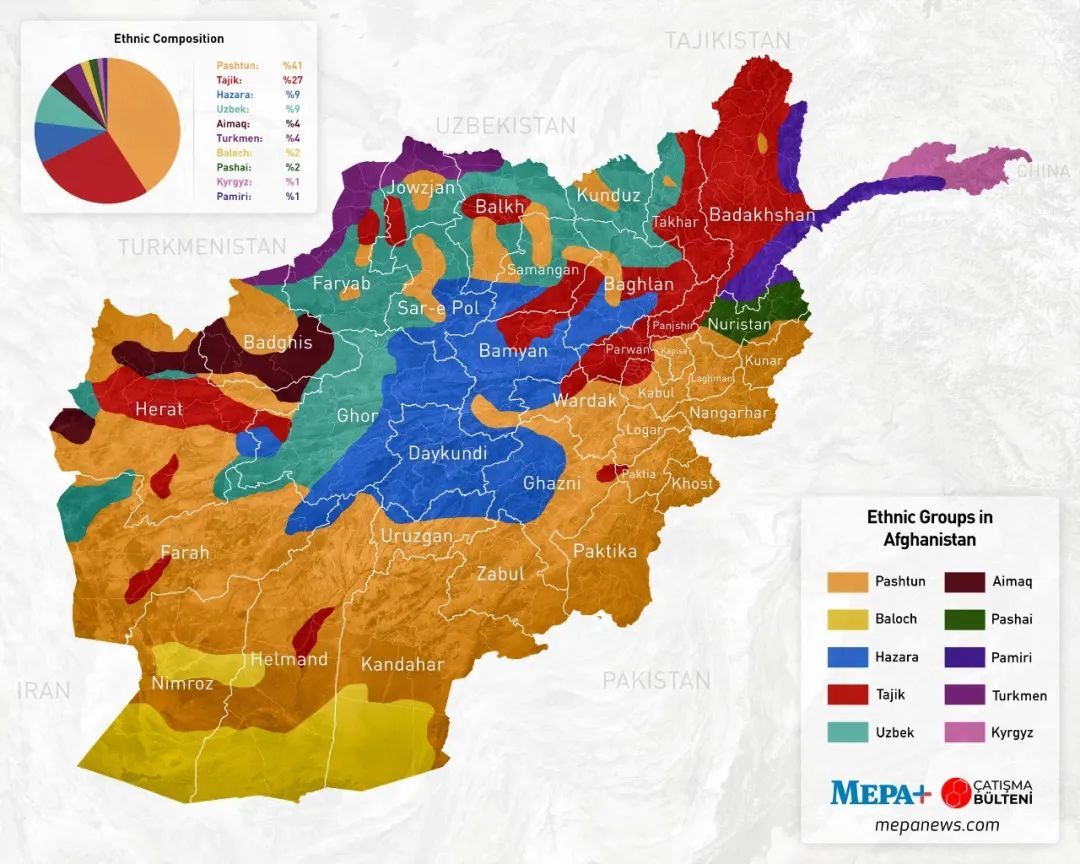
At the same time, an often overlooked but crucial factor is the very low political and social choice of women in the Pashtun tribal tradition. An Afghan-origin researcher commented that men have authority and decision-making power in the family, while rigid gender roles make women play little role in the public sphere [16]. A full half of the voices and "choices" of the Pashtun "people" are marginalized and ignored. A few tribal leaders held much more power than the average tribal male, who in turn held much more power than the average female. A very telling case is: an Afghan poll conducted by the Asia Foundation earlier this year showed that female citizens have much greater concerns and fears than their male counterparts about a Taliban-involved coalition government[17]:
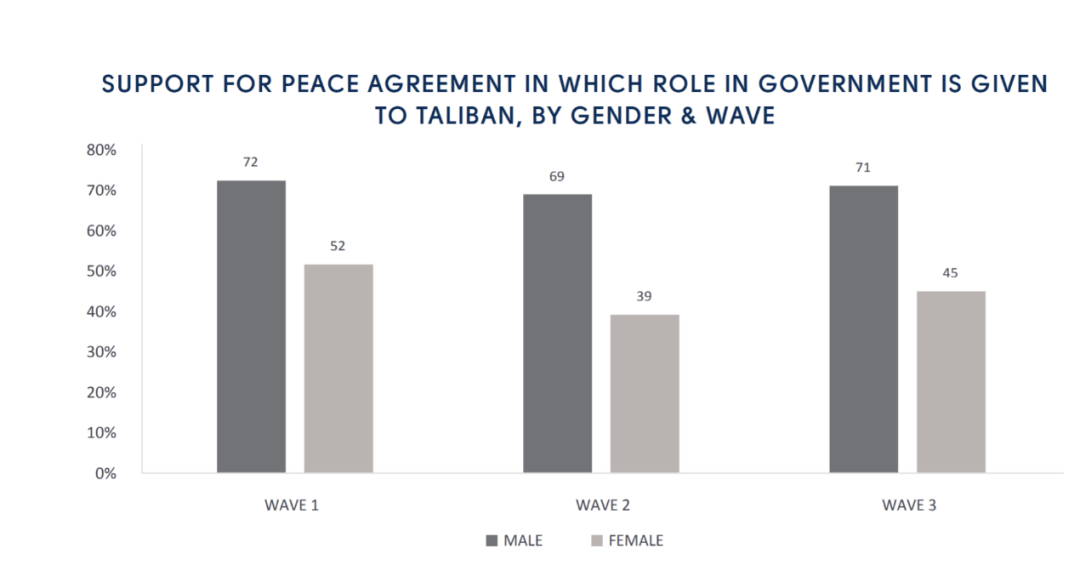
Whether it is from the previous government or the Taliban, women in power and negotiating delegations have very few voices, and their political influence is very limited. There were at least some women in the previous government, and the Taliban leadership was all men. An organization that involuntarily excluded a full half of the "people" from the political agenda was finally called "the people's choice", which makes one wonder if women are in the minds of various "old friends of the Taliban people" in China. Not seen as "second-class people" from the start.
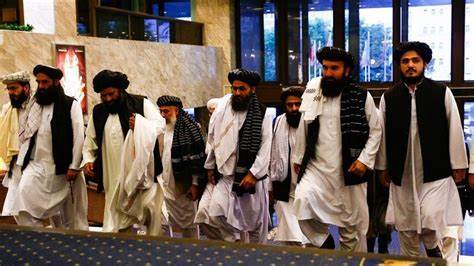
In addition, a large part of the Taliban’s funds come from donations and support from international religious conservative forces , especially organizations in the Gulf countries, and even Saudi Arabia’s official [18]; Pakistani religious forces provide the Taliban with training, funds and transportation, and it has long been is an open secret. [19] Among the Taliban troops fighting in Afghanistan, many are members of extremist organizations such as Al Qaeda and the East Turkestan Islamic Movement, and many are from Central Asia, Chechnya and other regions. [20] Without these shady international connections, the Taliban's victory would be unimaginable.
The Taliban's victory depends not so much on the support of the "vast" population as on the fact that their limited supporters are very determined, while their enemies are very loose, both militarily and politically. The majority of Afghans are incapable of intervening in political events and have no active aspirations for the Taliban. The outcome of the war was imposed on them, and many were left to look for an option that would bring security in the chaotic situation, whether it was working with the Taliban or risking fleeing the country.
Then, according to China’s consistent political terminology, for an organization that relies on clan power and religious and patriarchal structures to mobilize supporters, uses violence to deter potential non-cooperators, and relies on drug trafficking networks and international terrorist networks to obtain funds, What can it be called? It can only be described as a veritable "reactionary". It is true that the old Afghan government can be said to be "lost and helpless", but the Taliban can never be called "the people's choice".
Some may say that they are willing to recognize the legitimacy of such organizations that rely on oppressive structures to win—a view that can be approached from a political realist perspective, or from a "peace and stability" perspective. consider. This view is debatable. It is indeed a coherent political attitude, but those who adopt this type of logic need to realize that it is incompatible with the idea of "the people." According to the description of the concept of "people" above, "people" is a very modern concept - it refers to either a collection of equal individuals in a national community, or a collection of equal individuals of the working class in a society. That is to say, no matter what the extension of the concept of "people" is (that is, who the "people" includes or excludes), as the subject of political decision, every individual within it should be equal and should have the same right to speak and discretion. However, we have seen that the social structure and system from which the Taliban draws political power is completely contrary to "equality".
3 Conclusion
If one admits that "the Taliban is the choice of the people", a dilemma arises:
In one case, one identifies with religious authority and clan heads (owners of power and wealth) as "people's leaders" and represents "the voice of the people" (and so on, before the founding of the People's Republic of China, Huidao sect leaders, clan leaders, and youth gang leaders) such figures can also be called "people's leaders"); while marginalized and neglected women and other ethnic groups (even the poor) deserve a lower voice. This view is obviously very absurd.
Alternatively, acknowledging that "reactionaries" (that is, organizations that rely on oppressive structures to win) can also be "the people's choice" , without considering who is making the choice and how, or where the common people are. conditions are selected. Since the "reactionaries" gain power by relying on and further consolidating the oppressive, stratified social structure, equality of the different members of the "people" cannot actually exist - so we can even say that in the basic In the absence of the equality of the people, the "people" themselves cannot be formed . Then, the concept of "the people's choice" loses its proper "moral superiority" and becomes " the ultimate political synonymous with the victorious group. Simply put, it's a "winner".
Therefore, continuing to reason from this idea above, the following inference can be drawn: the reason why a force "should win" is because it is "the choice of the people." So how do you judge that this force is "the people's choice"? Because it organizes more efficiently, better manages the various (possibly "reactionary") social structures that exist in a region, and therefore better "wins". In the final analysis, it is a perfect structure: an organization is best able to win, so it should win, so it is legitimate to win, it is in line with "historical trends", and therefore "progressive".
After distorting the theory of revolutionary Marxism several times, it is undoubtedly a very interesting phenomenon to be able to defend the most traditional "win the king and lose the pirates" and the real politics that prioritizes interests.
We end with a quote from Lenin. Although the Taliban is actually closely connected to the global capitalist structure through opium and mineral trafficking, this sentence is still very applicable to many groups who call themselves "Marxists" but are actually "Party of Order":
What we should support is not any kind of struggle against imperialism. We do not support the struggle of the reactionary classes against imperialism, and we do not support the uprising of the reactionary classes against imperialism and capitalism.
——The Complete Works of Lenin, Volume 28
Thanks to Teabag, CC, LHY and Flùr na h-Alba for their valuable help!
Notes and References:
[2] risk-indexes.com/wp-content/uploads/2020/11/Brochure_GCI_EN_2020.pdf
[3] Scott Atran. A Question of Honour: Why the Taliban Fight and What to Do About It. Asian Journal of Social Science, Brill Academic Publishers, 2010, 38, pp.341-361.
[4] See Chapter IX of the Taliban by Ahmed Rashid; the Taliban had banned poppy cultivation in 2000, but have since reversed this decision.
[5] For example, "The people, and only the people, are the driving force behind the creation of history."
[7] https://nypost.com/2021/08/13/taliban-capture-three-more-provincial-capitals-in-afghanistan/
[9]https://www.nytimes.com/2020/03/24/world/asia/afghanistan-us-aid-cut.html
[10] https://www.sigar.mil/pdf/quarterlyreports/2021-01-30qr.pdf
[11] https://mp.weixin.qq.com/s/4HV9R-tAjmgzIayXf6Ro3g
[13] Scott Atran. A Question of Honour: Why the Taliban Fight and What to Do About It. Asian Journal of Social Science, Brill Academic Publishers, 2010, 38, pp.341-361.
[14] See [America] Tamim Ansali, "Game Without Rules"
[15] https://www.nytimes.com/2021/08/13/world/asia/afghanistan-rapid-military-collapse.html
[16] Women, patriarchy, and Traditional Methods: A postcolonial feminist critique of Pashtun Jirga; In book: Routledge Handbook of Feminist Peace Research (pp.89-98)
[18] https://www.nytimes.com/2016/12/06/world/asia/saudi-arabia-afghanistan.html
[19] https://www.dw.com/en/pakistan-taliban-donations-recruitment-on-the-rise/a-57703423
[20] https://asiatimes.com/2021/08/taliban-wont-readily-cut-ties-with-anti-china-etim/

Like my work?
Don't forget to support or like, so I know you are with me..
Comment…